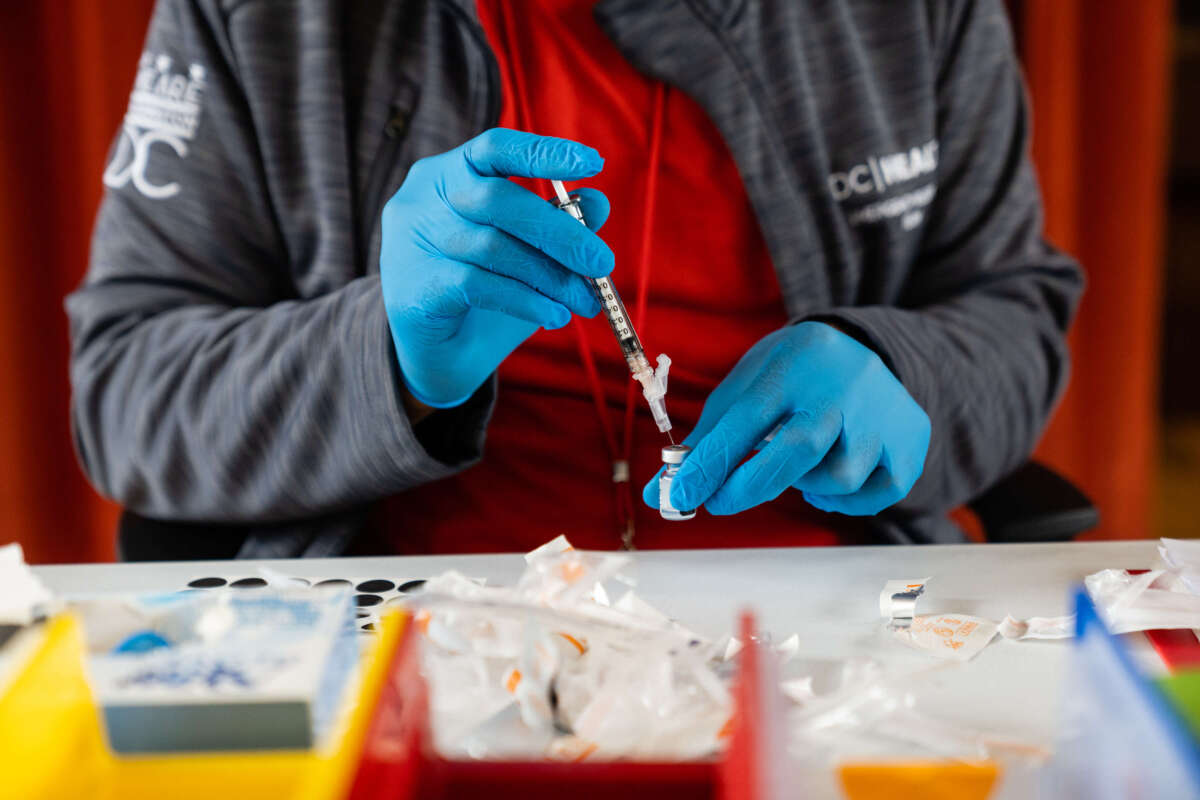Support justice-driven, accurate and transparent news — make a quick donation to Truthout today!
This summer’s COVID-19 wave has gotten so bad — even worse than winter peaks in some regions — the U.S. Food and Drug Administration (FDA) announced they are approving two vaccines early, but leaving one out for now. On Thursday, the agency used its emergency use authorization (EUA) to rubber stamp a group of updated mRNA vaccines produced by Moderna and Pfizer-BioNTech. They inoculate against the SARS-CoV-2 virus, specifically the KP.2 strain, which has been driving a large proportion of infections this summer.
The vaccines (Pfizer-BioNTech’s Comirnaty and Moderna’s Spikevax) are recommended for everyone six months and older. Shots will be available in days. To find a vaccination location near you, the Department of Health and Human Services says you can text your zip code to 438829, call 1-800-232-0233 or visit vaccines.gov (though the website is still being updated as of this posting.)
“Vaccination continues to be the cornerstone of COVID-19 prevention,” Peter Marks, M.D., Ph.D., director of the FDA’s Center for Biologics Evaluation and Research, said in a statement. “These updated vaccines meet the agency’s rigorous, scientific standards for safety, effectiveness and manufacturing quality. Given waning immunity of the population from previous exposure to the virus and from prior vaccination, we strongly encourage those who are eligible to consider receiving an updated COVID-19 vaccine to provide better protection against currently circulating variants.”
Last year, the FDA signed off on updated vaccines on September 11. But many regions are experiencing a surge this summer — with wastewater data indicating “very high” virus levels in 32 states and D.C. and an additional 11 states experiencing “high” levels. As such, reports were circulating earlier this week that the FDA may speed up approval.
mRNA vaccines use a nucleic acid known as RNA to prepare the immune system from attacks by specific pathogens. Using a bespoke RNA strand with a “message” (hence the term “messenger RNA”), mRNA vaccines transmit information about potential pathogens from genetic codes in the nucleus to the cytoplasm where pathogen-fighting proteins are manufactured. In the case of the mRNA vaccines manufactured by Pfizer and Moderna to fight COVID-19, the mRNA helps a human’s cells fight the SARS-CoV-2 virus through their spike proteins. The spike proteins are the little points that emerge out of the coronavirus, like spines jutting from a sea urchin, and the SARS-CoV-2 virus uses them to infect a patient’s cells.
Other COVID vaccines that don’t use mRNA technology are in development, such as a new shot from drugmaker Novavax. Though the company filed for EUA, it does not seem to be granted yet as the company continues to work with the FDA as it completes its review. Last year, Novavax’s shot was also approved weeks after Pfizer and Moderna were given the green light.
“We expect to have authorization in time for peak vaccination season,” Novavax said in a statement. “Our 2024-2025 formula COVID-19 vaccine targets JN.1, the ‘parent strain’ of currently circulating variants and should provide acceptable coverage and cross-reactivity against JN.1 lineage viruses, including KP.2.3, KP.3, KP.3.1.1 and LB.1.1. Upon authorization, Novavax’s vaccine will be the only protein-based option available in the U.S. for use in individuals aged 12 and older to prevent COVID-19.”
Media that fights fascism
Truthout is funded almost entirely by readers — that’s why we can speak truth to power and cut against the mainstream narrative. But independent journalists at Truthout face mounting political repression under Trump.
We rely on your support to survive McCarthyist censorship. Please make a tax-deductible one-time or monthly donation.
